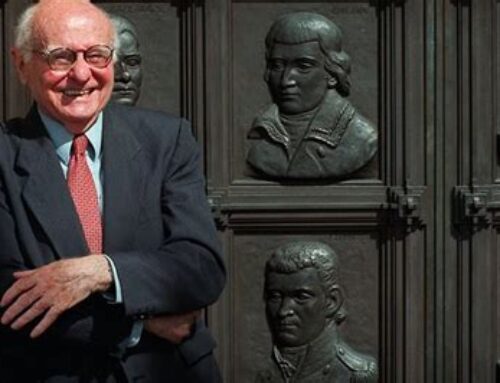Feature image via The Verge
Gabriella Skoff
The U.S. 2020 Democratic Primary is well underway, exhibiting the greatest diversity and highest number of Democratic candidates in U.S. history. From career politicians to a self-help guru to a former tech executive and everything in between—this extraordinary breadth makes for an interesting array of policy positions, on topics both expected and fringe. While technological innovation, economic growth and security have all become inextricably linked to American politics in general, the Democratic Party in particular has worked to frame itself as the harbinger of technological innovation since at least the Kennedy years. This year, Democrats and Republicans have moved closer together on technology as regulating Big Tech has become a salient challenge in government. Many Democrats in this year’s Primary are also heralding the manufacture and export of green technology as part of their solution to climate change and domestic unemployment. But one candidate in America’s 2020 Democratic line-up is talking about innovation and technology in a very serious way: Andrew Yang.
Andrew Yang is a former tech entrepreneur most well-known as a champion for a Universal Basic Income (UBI) through his flagship proposal, the Freedom Dividend. He frames his argument for the implementation of a UBI with the encroaching threat of mass job loss, as automation continues to permeate high-employment sectors like retail and the foodservice industry. With close to no political experience on his resume, nearly all of Yang’s policies rely on his knack for Silicon Valley hype and focus on the promises and threats of technology. His “human-centred capitalism” platform boasts a number of compelling and futurist tech-forward solutions, including what he refers to as the “new currency” called Digital Social Credit, which would see the creation of positive social value transformed into financial capital for the individual. Though many of Yang’s ideas may sound like sci-fi realities, he seems to view technology more reasonably as a useful tool to be harnessed in America’s path forward, making his message fall short of techno-utopianism and settle more comfortably into techno-realism.
Unsurprisingly, Yang is the only Democratic candidate to make specific mention of a quantum policy, which centres around two neat “steps”, according to Yang’s 2020 candidacy website:
First, and immediately, we need to invest in and develop new encryption standards and systems, and immediately shift to using these quantum computing-resistant standards to protect our most sensitive data. This won’t be easy or cheap, but it is necessary. Second, we must heavily invest in quantum computing technology so that we develop our own systems ahead of our geopolitical rivals.
While Yang’s quantum policy has been criticized by some for being simplistic or simply an activation of a buzzword frenzy, he remains the only candidate to have one. His policy is palatably outlined as a two-step program on his website but importantly seems to suggest Yang’s commitment to government investment in quantum technologies in order to increase both defensive and offensive U.S. quantum capacities. This stance clearly signifies Yang’s opinion that having an advantage over the rest of the world in quantum technology is a strategy that will be integral to the maintenance of American hegemony. Further, his position on foreign policy, which he characterizes as one of “restraint and judgement”, is well-suited to a quantum-enhanced security capacity that, in a modern show of military might, could demonstrate U.S. technological superiority to attack and defend without putting boots on the ground.
In these still early days of the race for Democratic candidacy, Yang’s and most other’s policies lack the proper framing and focus that will be required to get the public onside. While Yang may be wearing rose-coloured glasses when he emphasizes the power of technology to solve social ills, this angle has made him stand out from an array of incredibly diverse Democratic candidates. His current popularity ratings place him in the top ten candidates, above even well-known career politicians like Cory Booker, who have had much louder voices thus far in the Democratic debates. It is clear that there is something about Yang’s message that resonates with Americans. Though his press-time has been minimal, he has achieved some obvious success in delivering his message about the promises and perils of emerging technologies and how to harness and minimize these.
It is unlikely that Yang’s tech-forward platform will be enough to win him the nomination but the fact that it has already taken him this far should tell us something. Like most populations throughout history, Americans are concerned about the influence and the impact that emerging technologies are having on their daily lives and will continue to have on their futures. Americans seem to be interested in Yang because they want someone at the helm who has the prescience to control and channel these technologies in their best interest. At least in the U.S., however, running on a political platform focused almost exclusively on emerging technologies poses two major challenges: framing and a far-reaching, futurist vision.
First, a political message framed by tech-forward policy needs to be delivered in an accessible and pressing way. Yang’s framing of job loss due to automation is, in fact, an example of how this can be done effectively. Unemployment is a very real issue to both Democrats and Republicans and Yang’s message activates and engages both of these parties while framing the issue in terms of emerging technology. Second, in order to harness the power of tomorrow’s technology (quantum computing, for example), one needs to have sights set on the future. And not just the near future, but a future that is well beyond the purview of one presidential term of four years, or even two of eight years. This requires a bold vision that can border on futurist and risks the argument of the unknown. How can emerging technologies be channelled/regulated if we don’t even really know what they will do? The reality is that most politicians speaking about technology are either unable to grasp and communicate the topic of emerging technologies or not looking far enough into the future to really be able to create proactive policy in this area.
It is perhaps the most formidable challenge in politics, getting the general population to care about far-sighted goals, and one that has rarely been achieved outside of the force of dictatorships, whether benevolent or not. Generally, most communities (bar Silicon Valley) are not going to be receptive to the message of a platform built solely around emerging technology. In contrast, most people are concerned with matters they can relate to and issues that seem far more pressing, such as employment, infrastructure or education. Technology, of course, is increasingly an imposing factor in the conversation on these and most other topics of political debate, but it is often an intangible factor that requires a certain amount of faith. Like Church and State, Technology has become inextricably and implicitly intertwined with politics. Some, like Yang, speak about it with as much fervour and conviction. A candidate with a strong ethos of technological innovation and regulation certainly has the best chance of creating a government centred on these values. This begs the questions—is mixing technology and politics a good thing? Or, perhaps a more realistic question, like the relationship between Church and State, is it even avoidable?







Leave a Reply